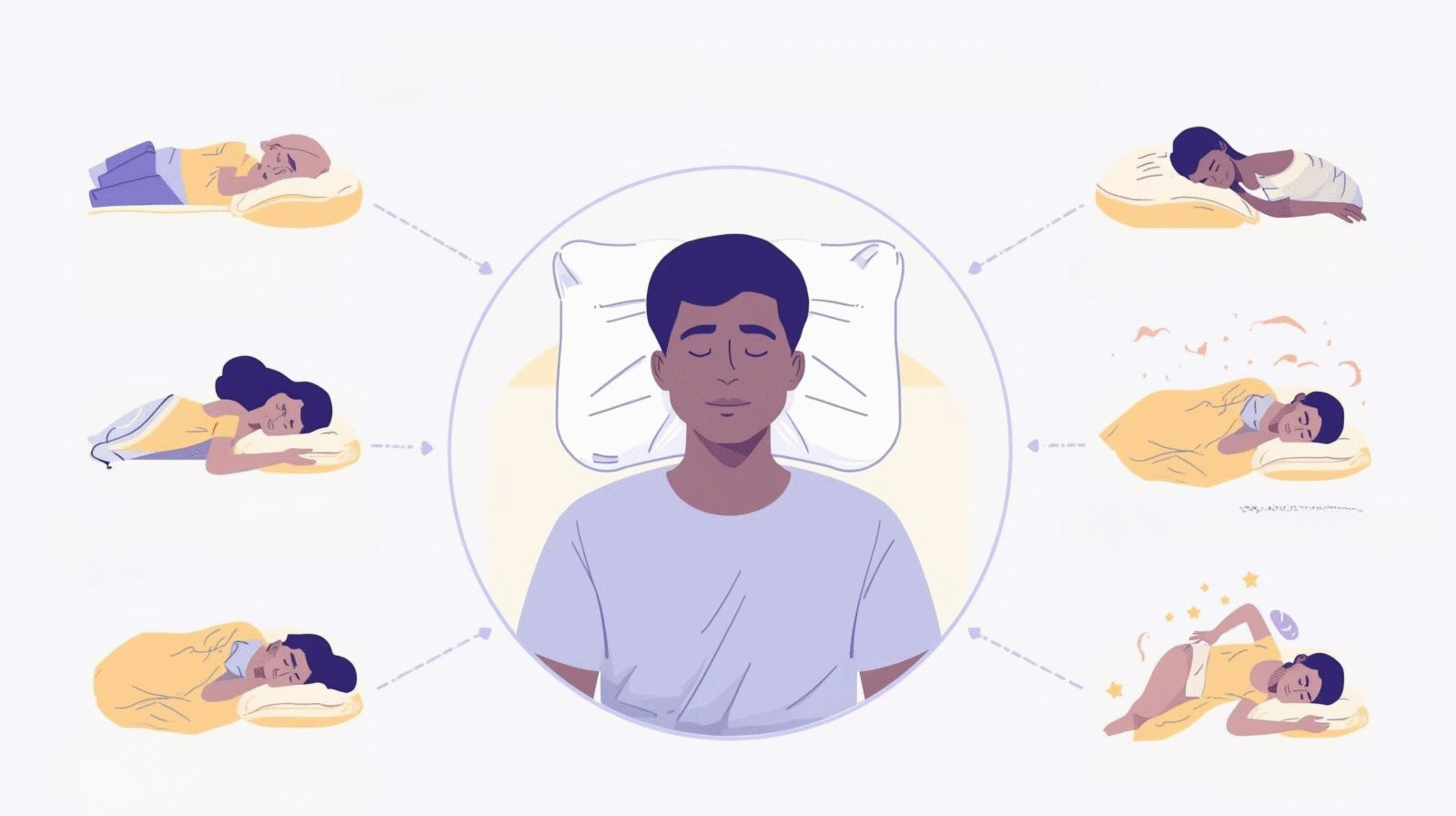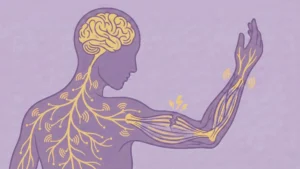Neck pain is a modern-day epidemic. It can start subtly; just a stiffness here, a mild ache there; and suddenly, you are googling “how to relieve neck pain” while blinking back tears of frustration. You may think the problem lies with the pillow; after all, it’s called a pillow for neck pain, right? But what if the very habits formed around your pillow usage are actually making things worse? Buckle up (not literally, because that would be awkward), because we are about to uncover the 7 nighttime habits that sabotage your neck pain relief and how to fix them for better sleep now.
Click here to know more about how to prevent neck pain:
- https://betterhood.in/learn/why-cervical-pillows-are-the-best-solution-for-neck-pain/
- https://betterhood.in/learn/chronic-neck-pain-due-to-muscular-imbalance-understanding-the-cause/
Why Neck Pain Persists Even With the Right Pillow?
Most individuals waste hours searching various kinds of pillows such as orthopaedic pillows, memory foam pillows, specifically designed for side sleepers, in a bid to identify the most suitable pillows to relieve their neck pain. However, the pillow which is completely ergonomic may not come to your use for relieving pain just because of your night routines [1].
Overlooked Causes of Nighttime Neck Pain
Research has shown that tight muscles, poor sleeping posture, and long sitting can also be causes of neck and shoulder pain after sleeping irrespective of the type of pillow you use [2]. Sleeping improperly can lead to a neck bending or twisting in a strange position and this might strain to already weak muscles and nerves.
How Poor Habits Cancel Out a Good Pillow?
Think of your pillow as a trusty sidekick in your neck pain treatment journey. If you are ignoring your pillow use habits, you are essentially telling your sidekick to fight crime while you nap on the couch. Miracles would not work for side sleepers or back sleepers even with the best sleeping pillow, if you constantly scroll on your phone before sleep, fall asleep in an awkward pose, or ignore stretches that relieve muscle tension [3].
The Link Between Everyday Posture and Nighttime Discomfort
It’s not just about bedtime; daytime posture spills over into sleep quality. Desk workers hunched over laptops and smartphone addicts often develop “text neck,” a condition where forward head posture strains neck muscles leading to pain and stiffness. This tension often worsens overnight.
7 Common Nighttime Habits That Aggravate Neck Pain
A pillow for neck pain is only as good as the habits that surround its use. Even the best pillow may not be effective due to harmful nighttime practices. Let’s dive into seven common habits that might secretly be making your neck pain worse, and measures to tune up your nighttime routine for better neck pain relief and more restful sleep.
Habit 1: Using a Pillow That’s Too Soft or Too Firm
The Dangers of Poor Pillow Support
Your neck might pain more in the morning if you choose a pillow that is as soft as a cloud or as firm as a brick. A pillow that is too soft would not generally support the natural curve of your neck [4]. Because of this, your head dips, which makes your joints and muscles stretch in ways that are not typical. On the other hand, a pillow that is too firm can push your head to the sideways or upwards, which can put stress on your muscles and joints.
The spine is like a string of pearls; If your spine is not aligned, your vertebrae, or pearls, may rub painfully against each other or the soft tissues around them. A pillow which is not posture-corrected can give you neck pain because of the spinal misalignment.
How Firmness Affects Spinal Alignment?
Firmness directly impacts how well your pillow supports your cervical spine. Ideally, your pillow should support the neck so the head stays aligned with the spine, maintaining the natural lordotic curve. Orthopedic pillows and memory foam options are often designed to mold to your neck’s curve and provide balanced firmness [5]. The trick is to find a pillow that is firm enough to support but soft enough to cushion – kind of like the Goldilocks of pillows, not too hard, not too soft.

Habit 2: Sleeping on Your Stomach
Why Stomach Sleeping Strains the Neck?
If you are a stomach sleeper, your neck is probably staging a revolt every morning. Turning your head to one side for prolonged periods pushes your neck spine out of alignment and strains the muscles on one side more than the other. This imbalance causes neck pain and stiffness, and worse, might lead to long-term chronic problems.
Stomach sleeping is strongly associated with increased neck pain after sleeping, mainly due to the forced rotation and extension of the neck [6]. Additionally, stomach sleeping also places pressure on your lower back, but that’s a story for another day.
Healthier Sleeping Position Alternatives .
Switching to sleep on your back or side is like sending your neck on an all-inclusive vacation. Back sleeping maintains neutral spine alignment, letting your neck rest peacefully. Side sleeping, especially with a pillow for neck pain side sleeper designed to fill the gap between your neck and shoulder, can be great for spinal support.
If you are a stomach sleeper with decades of habit, try slowly transitioning by using body pillows or placing pillows around your body to encourage side or back sleeping. It would not be easy, but your neck will thank you later, and probably let you sleep through the night.
Habit 3: Resting With Arms Under the Pillow
Shoulder Stress and Nerve Compression
Putting your arms under your pillow might feel cozy, but it can seriously crank up shoulder and neck pain. This position compresses nerves, restricts blood flow, and causes muscle fatigue, which can manifest as persistent neck and shoulder pain after sleeping .
Think of your shoulder as a highway for nerves and blood vessels. When you rest your arms awkwardly under a pillow, you are basically causing a traffic jam, and your muscles are not happy about the detour.
How to Relax Arms for Better Posture?
Keep your arms relaxed and alongside your body or gently wrapped around your pillow without stuffing them underneath. Alternatively, hugging a body pillow can maintain that comforting feeling without compromising posture. This small adjustment can relieve unnecessary strain on your shoulder girdle and improve neck pain relief overnight.
Habit 4: Falling Asleep With Devices in Bed
Tech Posture Problems Leading to Text Neck
Let’s face it: smartphones and tablets are our nighttime partners more often than we admit. But tilting your head downward for scrolling, texting, or binge-watching is a chief culprit behind “text neck;” a modern neck pain cause. This position overloads your neck muscles by increasing the load on the cervical spine, causing pain and stiffness that lingers after sleeping .
Research shows that the average head weighs about 10-12 pounds, but tilting it forward increases the effective weight on the neck to as much as 60 pounds [7]. Ouch! Your neck muscles have to work overtime just to keep that head up while you are doomscrolling at midnight.
Why Late-Night Scrolling Worsens Neck Stiffness?
Besides poor posture, the blue light emissions from your devices disrupt sleep quality by interfering with melatonin production, contributing to restless nights and heightened pain sensitivity [8]. Combine poor sleep with neck strain and you have a perfect storm for worsening neck pain after sleeping.
Try swapping device time for relaxing activities like reading a book or meditating. If you use devices, do some neck stretches afterward and keep screen time limited before bed.
Habit 5: Skipping a Pre-Sleep Stretch Routine
Neck and Shoulder Tension Carried Into Sleep
Muscle tightness and tension don’t check the clock when you hit the pillow; they come to bed with you. Stiff shoulders and neck muscles restrict blood flow, making it harder for your body to relax and heal overnight. This tension worsens neck pain and can leave you waking up feeling like a bobblehead doll in desperate need of repair.
Simple Relaxing Stretches Before Bedtime
Incorporate a simple routine of neck pain exercises such as chin tucks, shoulder rolls, and gentle side neck stretches to encourage flexibility and blood circulation. These stretches have been shown to reduce muscle tightness and improve neck pain relief significantly. Plus, they double as a chill-out ritual to calm your mind before sleep.
Habit 6 – Sleeping in an Awkward Position All Night
How Lack of Movement Tightens Muscles?
Sleeping in a static, awkward position for hours can tighten muscles and joints, increasing discomfort after waking. Lack of micro-movements during sleep causes accumulation of muscle stiffness, which often translates into neck pain and shoulder ache by morning.
Imagine your muscles as stiff leather; if you don’t move, they get hard and creaky. Encouraging natural adjustments even while asleep is key to avoiding that morning neck pain.
Encouraging Micro-Adjustments During Sleep
Use a supportive pillow that promotes spinal alignment and gently allows head and neck movements during sleep cycles. This can reduce muscle strain and promote restful sleep without compromising neck support. Orthopedic pillows that contour your neck help facilitate this micro-adjustment naturally.
Habit 7: Ignoring Early Signs of Chronic Neck Pain
Neck Pain as a Warning Signal
Neck pain is your body’s lighting system flashing “Warning: Fix me!” at you. Ignoring persistent or worsening neck pain allows underlying issues such as muscle imbalances, nerve compression, or joint problems to develop into chronic conditions.
Research shows untreated neck pain can lead to decreased quality of life, affecting sleep and daily functioning [9]. The best pillow for neck pain may not work if you don’t address these deeper issues.
When to Seek Professional Treatment?
If your neck pain is severe, persistent beyond a few weeks, or accompanied by symptoms like numbness, weakness, or tingling in arms and hands, it’s time to consult a healthcare professional. Treatments like physiotherapy, ergonomic interventions, and targeted neck pain treatment plans are often necessary to complement pillow use and other home remedies .
How to Relieve Neck Pain for Better Sleep?
Choosing a Pillow That Works With Your Posture
The best pillow for neck pain side sleeper is not a one-size-fits-all. Consider ergonomically designed contour pillows that maintain the natural curvature of your cervical spine. Pillows with adjustable height and firmness can also be customized to match your specific needs, whether you sleep on your back, side, or alternate positions. Orthopedic pillows support spinal alignment, reducing neck and shoulder pain over time.
Heat, Cold, and Massage for Night Relief
Applying a warm compress before bed can loosen tight muscles while cold therapy can reduce inflammation. Gentle massage or self-myofascial release techniques targeting neck muscles can further relieve tension and prepare you for sleep without stiffness.
Neck Pain Exercises That Help Before Bedtime
Simple stretches like chin tucks, shoulder shrugs, and controlled neck rotations relax muscles and improve range of motion. These exercises work synergistically with correct pillow usage for neck pain relief by promoting blood flow and flexibility .
Long-Term Neck Pain Prevention Strategies
Building Better Daytime Posture Habits
Spending hours hunched forward at work can undo your bedtime efforts. Ergonomic chairs, standing desks, and taking frequent breaks to stretch reduce strain on neck muscles and prevent the progression of neck pain .
Adjusting Your Mattress and Sleep Setup
A supportive mattress complements a good pillow. Too soft or too firm mattresses distort spinal alignment, worsening pain. Ensuring the full sleeping environment supports neutral spine positioning is crucial.
Stress Management and Relaxation for Healing
Stress tightens muscles, including those in the neck and shoulders. Practices like yoga, meditation, and gentle stretching reduce muscle tension and promote better sleep quality, aiding natural neck pain remedies .
When Neck Pain Needs Professional Attention?
Signs of Serious Neck and Shoulder Pain
If neck pain is accompanied by numbness, tingling, weakness, or severe stiffness, it’s time to see a doctor. Early intervention prevents chronic conditions and improves outcomes.
Treatment Options Beyond Home Remedies
Physical therapy, chiropractic care, and specialized orthopedic pillows can be prescribed by professionals to treat persistent neck pain effectively. Advanced treatments might include trigger point injections or pain management strategies.
Role of Physiotherapy and Orthopedic Guidance
Physiotherapists tailor exercises and recommend specific pillows or supports informed by your unique posture and condition. This expert guidance ensures proper healing and prevents further injury .
Takeaway on Neck Pain and Sleep Habits
Why Fixing Nighttime Habits Matters More Than the Pillow Alone?
A pillow is only as good as the habits that surround its use. Avoiding the 7 detrimental habits listed here can amplify the benefits of the best pillow for neck pain and transform your sleep experience entirely.
Combining the Right Pillow With Healthier Sleep Choices
Integrate proper sleep posture, timely pillow replacement, pre-sleep stretches, and stress management to create a holistic attack on neck pain causes.
Final Reminder: Small Changes Bring Lasting Relief
You don’t necessarily need to use expensive tools or complicated methods to cure neck pain. The little things you do to improve your habits and posture will make a major difference in how you feel when you wake up.
But if poor sleeping habits also making your back ache, don’t forget to check these articles:
- https://betterhood.in/learn/back-relief-belt-benefits-uses-and-buying-guide/
- https://betterhood.in/learn/car-backrest-support-for-chronic-back-pain-relief/
- https://betterhood.in/learn/posture-and-ergonomics-tips-for-pain-relief-prevent-your-muscles-and-joints-from-the-wear-and-tear/
FAQs About Pillows for Neck Pain
- What kind of pillow is best for neck pain?
You should choose a cushion that fits the natural curve of their neck. This is usually an orthopaedic or contour pillow that enables you to modify its firmness based on how you like to sleep.
- Can sleeping poorly cause neck pain even if you have a posture-corrected pillow?
Yes, of course. No matter what kind of pillow you use, sleeping in the wrong posture, using electronic devices in bed, or putting your arms under the pillow can all make neck pain worse.
- How can I train myself to stop stomach sleeping?
No matter in whichever positions you sleep, use body pillows or cushions. This would reduce your neck pain gradually.
- Do neck stretches before bedtime help to relieve the pain?
In fact, the plain routine stretches such as shoulder roll and chin tuck can reduce pain when sleeping since they facilitate the circulation of blood, muscle relaxation as well as alleviating stiffness in the neck.
References
- Mayo Clinic (2025). Sleep tips: 6 steps to better sleep. Retrieved from: https://www.mayoclinic.org/healthy-lifestyle/adult-health/in-depth/sleep/art-20048379 [Viewed on 17 September 2025]
- Lee, W. H., & Ko, M. S. (2017). Effect of sleep posture on neck muscle activity. Journal of physical therapy science, 29(6), 1021-1024. doi: 10.1589/jpts.29.1021
- Cleveland Clinic Health Essentials (2025). The Best Sleeping Positions for a Restful Night. Retrieved from: https://health.clevelandclinic.org/best-sleeping-position [Viewed on 17 September 2025]
- Lei, J. X., Yang, P. F., Yang, A. L., Gong, Y. F., Shang, P., & Yuan, X. C. (2021, October). Ergonomic consideration in pillow height determinants and evaluation. In Healthcare (Vol. 9, No. 10, p. 1333). MDPI. doi: 10.3390/healthcare9101333
- Mayo Clinic (2023). Choosing the Right Pillows for Neck, Back, and Knees. Retrieved from: https://store.mayoclinic.com/education/sleeping-and-aging-well/?srsltid=AfmBOoqdmk1cpomC_hCZox2CgXPzQONLHgrqnBKtHjmtL1T1rdtPRN4X [Viewed on 17 September 2025]
- Healthline (2025). What Causes Neck Pain After Waking Up and How to Treat It? Retrieved from: https://www.healthline.com/health/neck-pain/waking-up-with-neck-pain#takeaway [Viewed on 17 September 2025]
- Cho, H. M., Choi, J. R., Moon, J. H., Cho, K. J., & Kim, S. W. (2024). Evaluation of an assistive exosuit for alleviating neck and shoulder muscle fatigue during prolonged flexed neck posture. Journal of neuroengineering and rehabilitation, 21(1), 232. doi: 10.1186/s12984-024-01540-5
- Silvani, M. I., Werder, R., & Perret, C. (2022). The influence of blue light on sleep, performance and wellbeing in young adults: A systematic review. Frontiers in physiology, 13, 943108. doi: 10.3389/fphys.2022.943108
- Lee, M. K., & Oh, J. (2022). The relationship between sleep quality, neck pain, shoulder pain and disability, physical activity, and health perception among middle-aged women: a cross-sectional study. BMC Women’s Health, 22(1), 186. doi: 10.1186/s12905-022-01773-3























